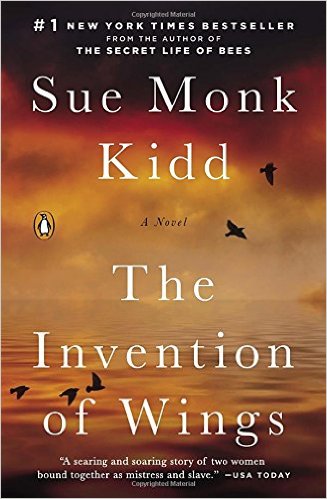Tag Archives: historical fiction
Summer and Fall Reading Round-Up: History, Both Fiction and Non, Plus Hard-Boiled Crime
Book Review: First Cosmic Velocity
Book Review: A Light of Her Own
Moving Beyond Auto-fiction to the Epic: Three Novel Recommendations
The English publication of the volumes of Karl Ove Knausgard’s My Struggle coincides with a renewed interest in “auto-fiction,” also known as the autobiographical novel. While I have read and enjoyed several of these works of auto-fiction, my favorite is Elena Ferrante’s Neapolitan Novels, which seemed to draw on some auto-fiction elements, but also used other literary devices such as image patterning and developing character arcs, while incorporating motifs of class, politics, art, motherhood, friendship, and feminism.
Since finishing the Neapolitan series I’ve found myself wanting to read more novels that span generations, placing themselves in historical context, in which history itself (just as Ferrante’s working class post-war Italy) becomes a character. Three recent novels fit this bill, and I recommend them to anyone desiring epic historical novels that educate as well as entertain.
BAD HISTORY CAN MAKE GOOD FICTION
Inspiration for good novels can come from anywhere. Sometimes stories 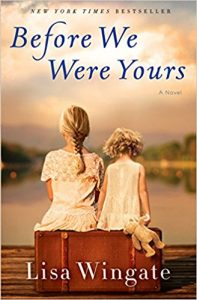 spring from experiences in the author’s life. Other times they explore experiences the author never had but wonders about. Recently I read two very good novels that were heavily influenced by horrific events of the recent past, and they started my thinking about how authors can use such events to give life to engrossing characters and spellbinding stories.
spring from experiences in the author’s life. Other times they explore experiences the author never had but wonders about. Recently I read two very good novels that were heavily influenced by horrific events of the recent past, and they started my thinking about how authors can use such events to give life to engrossing characters and spellbinding stories.
The first novel, Before We Were Yours, draws on the history of the Tennessee Children’s Home Society, run by Georgia Tann in Memphis during the first half of the twentieth century. The Society was well respected until the 1940s when authorities discovered that Tann had destroyed most of the adoption papers to cover up how many children were taken illegally from their parents to be offered to film stars and other wealthy clients for exorbitant adoption fees.
Little Town, Big Exposure: A Visit to the 9th Annual Gaithersburg Book Festival
Bad Weather Doesn’t Stop Book Lovers
In the opening hours of the Ninth Annual Gaithersburg Book Festival, the skies were an ugly steel gray and the precipitation shifted across mist, sprinkle, drizzle, and steady rain — and still the book lovers came out in force. Sporting umbrellas and rain ponchos, they were ready to hear their favorite authors read from and discuss books at the different literary tents, browse the new and used bookstores and independent booksellers, get their books signed while chatting with those favorite authors, grab something tasty from the food vendors, and go back again for more.
Of the many book festivals that the Baltimore-Washington area now enjoys, Gaithersburg is my personal favorite. Though it often draws over twenty thousand attendees and attracts many nationally known authors, it still has a very intimate feeling.
A Jolt of Inspiration: How One Writer Found Her Story
Back in September in this spot, I was ruminating on the joys and sorrows of writing historical fiction, and what could possibly motivate writers to pursue such a demanding genre. Many of us are drawn to specific points of inspiration, and I mentioned D.C.-based author Carrie Callaghan‘s encounter with a painting as one example. I went back to Carrie and asked if she’d like to share in more detail what drew her to this project and what kept her hooked through long bouts of research. Here’s what she said:
I Stopped and Stared
In the painting, she’s wearing a stiff lace collar as wide as her shoulders, and fine lace cuff at her wrists. In other words, no clothes a painter would actually paint in.
A Book to Capture Your Imagination
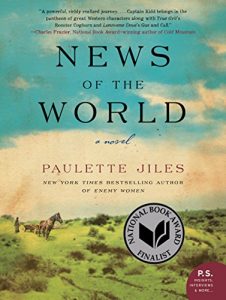 The 2016 novel News of the World by Paulette Jiles is beautiful, poetic, and riveting, and takes you to a world that’s familiar but full of mystery, all in just 240 pages. It fascinated me so much that I immediately sought out information on the history behind the fiction — the lives of children captured by Native Americans in mid-nineteenth-century Texas.
The 2016 novel News of the World by Paulette Jiles is beautiful, poetic, and riveting, and takes you to a world that’s familiar but full of mystery, all in just 240 pages. It fascinated me so much that I immediately sought out information on the history behind the fiction — the lives of children captured by Native Americans in mid-nineteenth-century Texas.
News of the World tells the story of Captain Jefferson Kyle Kidd, a seventy-one-year-old widower and Army veteran who travels the towns of North Texas entertaining audiences by reading selected articles from national and international newspapers. After one reading, an acquaintance, Britton Johnson, asks him to return a ten-year-old white girl to an aunt and uncle, her nearest living relatives, who live hundreds of miles away, near San Antonio.
The Joys and Sorrows of (Writing) Historical Fiction
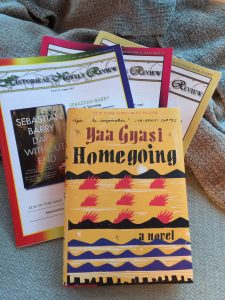 A friend of mine is an author whose favored genre is contemporary noir fiction—hard-boiled, edgy, dark. Since that’s what he writes, that’s also what he reads. Without prompting, though, he read my novel of historical fiction set in turn-of-the-twentieth-century Washington, D.C., a story that could never be described as “edgy”. Graciously, he told me what he liked about it, but concluded by saying, “I write fiction so I can make [stuff] up. Historical fiction seems like way too much work.”
A friend of mine is an author whose favored genre is contemporary noir fiction—hard-boiled, edgy, dark. Since that’s what he writes, that’s also what he reads. Without prompting, though, he read my novel of historical fiction set in turn-of-the-twentieth-century Washington, D.C., a story that could never be described as “edgy”. Graciously, he told me what he liked about it, but concluded by saying, “I write fiction so I can make [stuff] up. Historical fiction seems like way too much work.”
He’s got a point. Fiction is supposed to be fictional, right? Why go to the effort of having to do a ton of research and ensure detailed accuracy (because you know how those historical fiction fans are about that) when the story is supposed to be invented?
THE INVENTION OF WINGS—EXPLORING THE SOUL OF A WOMAN WHO LEARNED TO FLY
Ever since The Invention of Wings by Sue Monk Kidd was released 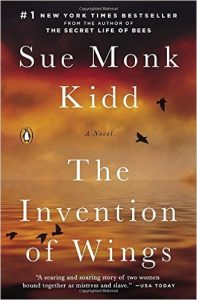 in 2014, I’ve heard it described as the story of the relationship between a white girl and the enslaved black girl who is given to her as her personal maid on her eleventh birthday. The novel is that story, but its deeper story is the evolution of the white girl, Sarah Grimké, into not only a leader of the abolitionist movement but also one of the first proponents of women’s rights.
in 2014, I’ve heard it described as the story of the relationship between a white girl and the enslaved black girl who is given to her as her personal maid on her eleventh birthday. The novel is that story, but its deeper story is the evolution of the white girl, Sarah Grimké, into not only a leader of the abolitionist movement but also one of the first proponents of women’s rights.
Sarah Grimké was a real person who was born into Charleston aristocracy and grew up there in the years before the U.S. Civil War. Kidd used diaries, letters, newspaper accounts, and Sarah’s own writing as well as biographical material to learn the facts of Sarah’s life and many of her desires, struggles, and motivations.
Nobel Prize Winner Patrick Modiano’s Dora Bruder
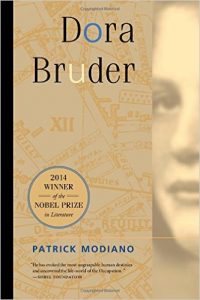 Last year when the Nobel Prize in Literature went to Bob Dylan, many people responded with the question, Why? Two years earlier when the Nobel Prize committee named Patrick Modiano the recipient of its literature prize, another question was often asked, Who?
Last year when the Nobel Prize in Literature went to Bob Dylan, many people responded with the question, Why? Two years earlier when the Nobel Prize committee named Patrick Modiano the recipient of its literature prize, another question was often asked, Who?
Though Modiano had published about thirty works in his native France, he was almost unknown in this country. Only a dozen of his novels had been translated into English, and the publishing house David R. Godine, which had published three of them, sold only about 8,000 copies.
The Nobel Prize changed that, and we readers are the beneficiaries.
The Secret Chord: A New Look at an Old Book
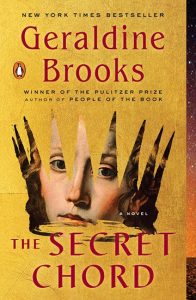 The Secret Chord by Geraldine Brooks has everything — love, hate, jealousy, violence, intrigue, battles, and faith. And why shouldn’t it? It’s a retelling of the biblical story of David, though the word “retelling” doesn’t do justice to Brooks’s success in breathing new life into the three-thousand-year-old character many readers think they already know.
The Secret Chord by Geraldine Brooks has everything — love, hate, jealousy, violence, intrigue, battles, and faith. And why shouldn’t it? It’s a retelling of the biblical story of David, though the word “retelling” doesn’t do justice to Brooks’s success in breathing new life into the three-thousand-year-old character many readers think they already know.
David is familiar to us as the man who killed the giant Goliath, united the people of Israel, played the harp, and wrote many of the Psalms. That’s about all I remembered of him when I opened the book. The novel so intrigued me that I’ve since reread the biblical accounts to see how they differ from Brooks’s.
IS HISTORICAL FICTION HISTORICAL?
Listening to James Michener’s Chesapeake on recent driving trips, I’m finding myself increasingly uncomfortable. He’s cheating, I think. These characters – they are so vivid. He didn’t have to make them up from whole cloth. Doesn’t that make his life as a novelist considerably easier? Or his creative achievements less impressive?
A Cozy House Full of Books
The holiday season finds me grateful for the profound reading experiences of childhood. Remember when reading a book was living the book? Certain books and authors left a mark on my reading, my writing, and my life. And for the reading of my childhood, I owe special gratitude to my great-aunt Mildred Campbell.
My grandfather’s baby sister Midge was small but mighty. She grew up on the family’s strawberry farm in Tennessee. Witty and determined, Mildred became a history professor at Vassar College. Her cozy house on College Avenue in Poughkeepsie was full of books─including a shelf for the Oxford English Dictionary. She loved books and words; talked a lot; read a lot; wrote a lot.
Book Review: The Bowl with Gold Seams
I’ve written frequently about my admiration for small-press publishing, folks who are driven more by their love of the written word than by any expectation of making a commercial killing. It’s that willingness to simply go with what they love that leads many small presses to build impressive catalogs of work by authors of remarkable talent. This month I’m highlighting another example of this marriage of small press to big talent.
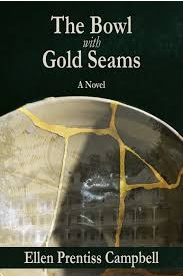 I originally heard about Ellen Prentiss Campbell from several sources almost simultaneously, one of which was our shared publisher. As small presses go, publishers don’t come much smaller than Apprentice House Press, run out of Loyola University. Of unique note, though, Apprentice House is both non-profit and student-run. Students learn by doing; authors get unparalleled input into the creative process behind bringing a traditionally published work into print.
I originally heard about Ellen Prentiss Campbell from several sources almost simultaneously, one of which was our shared publisher. As small presses go, publishers don’t come much smaller than Apprentice House Press, run out of Loyola University. Of unique note, though, Apprentice House is both non-profit and student-run. Students learn by doing; authors get unparalleled input into the creative process behind bringing a traditionally published work into print.
When Your Favorite Author Breaks Your Heart
Musings: When Your Favorite Author Breaks Your Heart
I’m a frequent reviewer for both the daily Washington Independent Review of Books (WIRoB) and the quarterly Historical Novels Review of the Historical Novel Society (HNS). As an author and avid reader, I find that reviewing offers a host of benefits for me. Not only do I end up reading books outside my normal genre preferences, which is good for me as a writer, it also introduces me to wonderful debut authors about whom I then get to spread the good word. Completely selfishly, it’s also pretty cool to have, say, Viking or FSG quote me in a tweet to their vast legions of followers.
But the cherry on top of the pie is the chance to review my favorite authors’ latest books.
Book Review: Open Country, A Civil War Novel in Stories
In my last posting, I highlighted Foreword Reviews magazine and its mission to draw readers to the best of independent publishing. What is perhaps most remarkable in the world of indie publishing is the sheer number of presses operating more or less on a shoestring in an industry whose margins continue to shrink. Indie presses typically don’t make fortunes for their owners, so what makes those people keep at it?
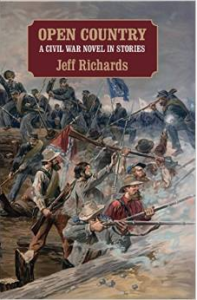 In a word, passion. Okay, perhaps two words, the other being dedication. Both are crucial to persevering in the best-seller-driven world ruled by publishing’s Big Five, but that big-press culture certainly leaves behind underserved readers and underrepresented writing voices, which is where indie presses shine.
In a word, passion. Okay, perhaps two words, the other being dedication. Both are crucial to persevering in the best-seller-driven world ruled by publishing’s Big Five, but that big-press culture certainly leaves behind underserved readers and underrepresented writing voices, which is where indie presses shine.
Passion, dedication, and perseverance all describe Richard Peabody, the force behind Gargoyle, the Washington, D.C.-based
5/10/2016. INTERVIEW WITH JAMES SCOTT, AUTHOR OF THE KEPT
5/10/2016. INTERVIEW WITH JAMES SCOTT, AUTHOR OF THE KEPT
Only a brave author would create his debut novel with characters who are different from him in almost every way. James Scott, author of The Kept, took on that challenge and compounded it with a harsh setting and even harsher themes. But as I said in my review of The Kept last month, Scott gives his characters multi-dimensional personalities that shine against the turmoil of the story. I was eager to ask him how he combined those elements so well. He shares some of his thoughts on process and inspiration below.
are different from him in almost every way. James Scott, author of The Kept, took on that challenge and compounded it with a harsh setting and even harsher themes. But as I said in my review of The Kept last month, Scott gives his characters multi-dimensional personalities that shine against the turmoil of the story. I was eager to ask him how he combined those elements so well. He shares some of his thoughts on process and inspiration below.
Scott’s previous work has been short listed for the Pushcart Prize and nominated for the Best New American Voices.
Writers Can’t Get Enough of World War II
5/7/16 — Novelists Still Intrigued by World War II
What is it about war that produces such compelling literature? And what is it about World War II, in particular, that continues to capture us like none other?
As long as there has been war—and that’s since the beginning of time—storytellers have been trying to capture the experience, first to preserve it for history (think epics like Homer’s Iliad) and then to try to make sense of it. They have tried to explore it as tragedy (Shakespeare’s Henry V), as philosophy (Tolstoy’s War and Peace), through psychology (Pat Barker’s Resurrection), as memoir (My War: Killing Time in Iraq by Colby Buzzell) and even as comedy (Joseph Heller’s Catch 22).
